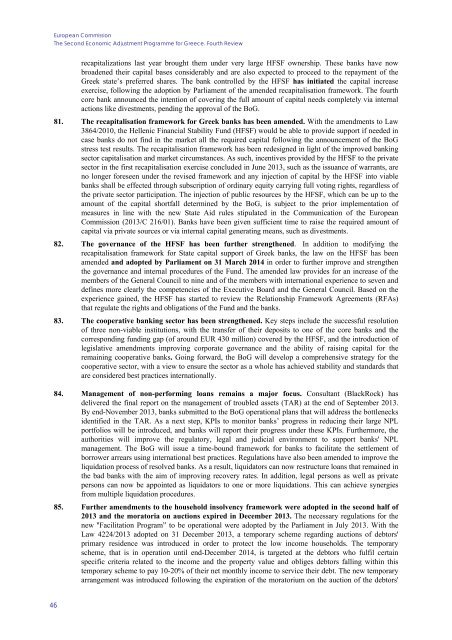ocp192_en
ocp192_en
ocp192_en
You also want an ePaper? Increase the reach of your titles
YUMPU automatically turns print PDFs into web optimized ePapers that Google loves.
European CommissionThe Second Economic Adjustm<strong>en</strong>t Programme for Greece. Fourth Reviewrecapitalizations last year brought them under very large HFSF ownership. These banks have nowbroad<strong>en</strong>ed their capital bases considerably and are also expected to proceed to the repaym<strong>en</strong>t of theGreek state’s preferred shares. The bank controlled by the HFSF has initiated the capital increaseexercise, following the adoption by Parliam<strong>en</strong>t of the am<strong>en</strong>ded recapitalisation framework. The fourthcore bank announced the int<strong>en</strong>tion of covering the full amount of capital needs completely via internalactions like divestm<strong>en</strong>ts, p<strong>en</strong>ding the approval of the BoG.81. The recapitalisation framework for Greek banks has be<strong>en</strong> am<strong>en</strong>ded. With the am<strong>en</strong>dm<strong>en</strong>ts to Law3864/2010, the Hell<strong>en</strong>ic Financial Stability Fund (HFSF) would be able to provide support if needed incase banks do not find in the market all the required capital following the announcem<strong>en</strong>t of the BoGstress test results. The recapitalisation framework has be<strong>en</strong> redesigned in light of the improved bankingsector capitalisation and market circumstances. As such, inc<strong>en</strong>tives provided by the HFSF to the privatesector in the first recapitalisation exercise concluded in June 2013, such as the issuance of warrants, ar<strong>en</strong>o longer forese<strong>en</strong> under the revised framework and any injection of capital by the HFSF into viablebanks shall be effected through subscription of ordinary equity carrying full voting rights, regardless ofthe private sector participation. The injection of public resources by the HFSF, which can be up to theamount of the capital shortfall determined by the BoG, is subject to the prior implem<strong>en</strong>tation ofmeasures in line with the new State Aid rules stipulated in the Communication of the EuropeanCommission (2013/C 216/01). Banks have be<strong>en</strong> giv<strong>en</strong> suffici<strong>en</strong>t time to raise the required amount ofcapital via private sources or via internal capital g<strong>en</strong>erating means, such as divestm<strong>en</strong>ts.82. The governance of the HFSF has be<strong>en</strong> further str<strong>en</strong>gth<strong>en</strong>ed. In addition to modifying therecapitalisation framework for State capital support of Greek banks, the law on the HFSF has be<strong>en</strong>am<strong>en</strong>ded and adopted by Parliam<strong>en</strong>t on 31 March 2014 in order to further improve and str<strong>en</strong>gth<strong>en</strong>the governance and internal procedures of the Fund. The am<strong>en</strong>ded law provides for an increase of themembers of the G<strong>en</strong>eral Council to nine and of the members with international experi<strong>en</strong>ce to sev<strong>en</strong> anddefines more clearly the compet<strong>en</strong>cies of the Executive Board and the G<strong>en</strong>eral Council. Based on theexperi<strong>en</strong>ce gained, the HFSF has started to review the Relationship Framework Agreem<strong>en</strong>ts (RFAs)that regulate the rights and obligations of the Fund and the banks.83. The cooperative banking sector has be<strong>en</strong> str<strong>en</strong>gth<strong>en</strong>ed. Key steps include the successful resolutionof three non-viable institutions, with the transfer of their deposits to one of the core banks and thecorresponding funding gap (of around EUR 430 million) covered by the HFSF, and the introduction oflegislative am<strong>en</strong>dm<strong>en</strong>ts improving corporate governance and the ability of raising capital for theremaining cooperative banks. Going forward, the BoG will develop a compreh<strong>en</strong>sive strategy for thecooperative sector, with a view to <strong>en</strong>sure the sector as a whole has achieved stability and standards thatare considered best practices internationally.84. Managem<strong>en</strong>t of non-performing loans remains a major focus. Consultant (BlackRock) hasdelivered the final report on the managem<strong>en</strong>t of troubled assets (TAR) at the <strong>en</strong>d of September 2013.By <strong>en</strong>d-November 2013, banks submitted to the BoG operational plans that will address the bottl<strong>en</strong>ecksid<strong>en</strong>tified in the TAR. As a next step, KPIs to monitor banks’ progress in reducing their large NPLportfolios will be introduced, and banks will report their progress under these KPIs. Furthermore, theauthorities will improve the regulatory, legal and judicial <strong>en</strong>vironm<strong>en</strong>t to support banks' NPLmanagem<strong>en</strong>t. The BoG will issue a time-bound framework for banks to facilitate the settlem<strong>en</strong>t ofborrower arrears using international best practices. Regulations have also be<strong>en</strong> am<strong>en</strong>ded to improve theliquidation process of resolved banks. As a result, liquidators can now restructure loans that remained inthe bad banks with the aim of improving recovery rates. In addition, legal persons as well as privatepersons can now be appointed as liquidators to one or more liquidations. This can achieve synergiesfrom multiple liquidation procedures.85. Further am<strong>en</strong>dm<strong>en</strong>ts to the household insolv<strong>en</strong>cy framework were adopted in the second half of2013 and the moratoria on auctions expired in December 2013. The necessary regulations for th<strong>en</strong>ew ''Facilitation Program” to be operational were adopted by the Parliam<strong>en</strong>t in July 2013. With theLaw 4224/2013 adopted on 31 December 2013, a temporary scheme regarding auctions of debtors'primary resid<strong>en</strong>ce was introduced in order to protect the low income households. The temporaryscheme, that is in operation until <strong>en</strong>d-December 2014, is targeted at the debtors who fulfil certainspecific criteria related to the income and the property value and obliges debtors falling within thistemporary scheme to pay 10-20% of their net monthly income to service their debt. The new temporaryarrangem<strong>en</strong>t was introduced following the expiration of the moratorium on the auction of the debtors'46


